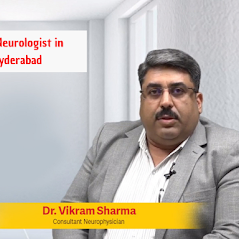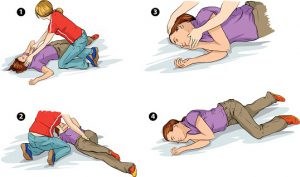
Epilepsy Specialist Doctor in Hyderabad
Dr. Vikram Sharma
Department of Neurology
Sunshine Hospitals Gachibowli, Hyderabad
Epilepsy and Types of Seizures
Dr. Vikram Sharma is the best epilepsy specialist doctor in Hyderabad. Being an experienced epilepsy specialist doctor, he treats all types of epilepsy conditions. He possesses hands-on experience and expertise in treating generalized, local and complex seizures in patients.
What is Epilepsy?
Epilepsy: Disruption of the electrical activity of the nerve cells and failure of proper communication between the nerve cells (abnormal brain activity) causes a neurological disorder known as epilepsy. Seizures resulting due to this abnormality can affect the behaviour and the manner in which the affected person sees things around him. A person with epilepsy experiences unusual behaviour, sensation and loss of awareness. Seizures are of different types: general, local, and complex.
What are the different types of seizures?
Epilepsy or seizures are classified into two major types:
Generalized: In this type, seizures are caused due to diffused abnormal electrical activity spread throughout the brain completely.
Focal (Partial or localized): In this type, seizures are caused due to electrical impulses generated from a small or localized area of the brain (focus or partial)
Generalized Seizures or Grand Mal
Symptoms of a generalized tonic-clonic seizure
Loss of consciousness: The patient usually loses consciousness and then collapses.
The body of the patient stiffens (muscles exhibit rigidity and stiffness). Stiffness is generalized and the phase of the seizure is known as tonic. The next phase is atonic – wherein the patient loses elastic tension of the muscles (tone) in the arms and the legs and then suddenly falls.
Next, the patient enters into the next phase…
A clonic phase of the seizure: The body of the patient jerks and onlookers can see the movements as violent jerkings.
Repetitive, rhythmic jerking movements that involve both sides of the body at the same time. After this phase, the patient enters into postictal or after-seizure phase – which is characterised by deep sleep.
During this phase, there is a risk of injury, falls, tongue biting and urinary incontinence.
Absence seizures: These are somewhat tricky to understand. Patients themselves are unaware that they are having seizures though they may have a feeling of losing time.
Absence seizures begin and ends suddenly and occurs many times in a day. Patients briefly lose consciousness for a few seconds with a few or no symptoms. An individual who experiences this type of seizures seems to have lost somewhere as they suddenly stop the activity they are doing and stare blankly.
Myoclonic: Brief shock-like muscle jerks (sudden unintended muscle contractions – rapid involuntary muscle contractions) characterized by a sudden increase in muscle tone. Patients often describe the brief jerking movement as just like electrical shocks. The movement can be sudden, repetitive involving face, arm or leg or more than one part of the body; sometimes also involving both sides of the body. Myoclonic seizures can sometimes become violent resulting in drooping and other risky involuntary actions.
Focal (Partial or localized)
Simple partial seizure (awareness maintained)
Symptoms involving motor functions – muscle spasms, muscle rigidity, muscles stiffness, jerking, head-turning and body stiffening.
Symptoms affecting sensory functions – unusual sensations of smell, taste, hearing, vision or touch. This may be due to the involvement of any of the five sensory nerves. Aura is a term used to describe sensory symptoms.
Autonomic symptoms: The symptoms most often involve an unusual sensation in the stomach. It is known as gastric uprising.
Psychological symptoms: These include unusual pleasure, fear, phobias, and other emotions and psychological phenomena.
Complex partial (awareness impaired)
Complex partial seizures are characterized by the following symptoms: impaired awareness. The patient seems to be unaware of what is happening. Some patients stare into space. The other symptoms include purposeless and repetitive body movements, which are involuntary but coordinated. These symptoms are known as automatisms. For instance – hand movements, walking around, fidgeting (restless movement), chewing and lip-smacking.
Focal seizure followed by a generalized seizure (Secondary generalized seizures): This type of seizure begins in one part of the brain and spreads to both the sides of the brain. The symptoms (muscle stiffness, jerks and convulsions) are same as generalized seizures symptoms.
Dr Sharma diligently handles intricate seizures and deals with all types of seizures with immense profoundness. His intricate diagnosing approach and expertness in handling such complex seizures make him the most sought-after neurologist – who specializes in the treatment of epilepsy.
Majority of the cases of epilepsy can be managed diligently with medications.
Dr. Vikram Sharma’s prime areas of interest include epilepsy, seizures, pain management, headache, spinal disorders, stroke, migraine, and neuro-oncology.
He has profound expertise in diagnosing and treating different types of seizures including general (absence seizures) and the focal seizures including simple and partial complex seizures; Dr. Vikram Sharma also treats tension headaches, migraines and other chronic headaches.


